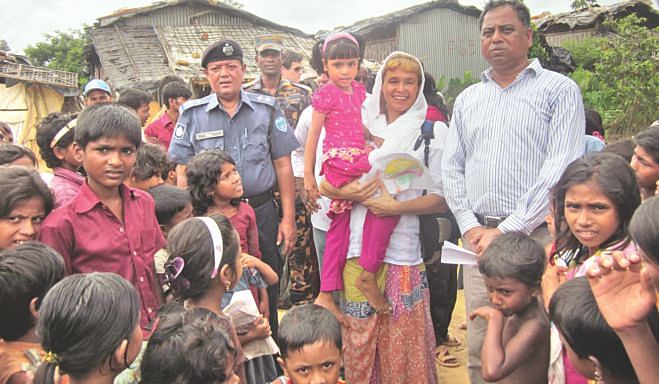Root causes of Rohingya crisis lie in Myanmar
The Daily Star (TDS): While the Rohingya plight came to the spotlight in 2012, UNHCR has been involved in this for a very long time. What is the UNHCR's role in dealing with the Rohingyas residing in Bangladesh?

Stina Ljungdell (SL): For the past decades there has been movement by Rohingyas to Bangladesh; they have come in waves. The UNHCR was asked by the government of Bangladesh to assist them in 1991/2, when almost 250,000 refugees had come to Bangladesh. There was a massive repatriation in 1992 and further movements back to Myanmar till 2005 but no more after that. At present, there are about 31,000 Rohingyas residing in two refugee camps, of which some 25,000 are currently registered with the government of Bangladesh. UNHCR and the government of Bangladesh are in the process of conducting a joint verification with the aim to establish a joint database. UNHCR works in tandem with the government to provide the refugees with food, shelter, primary education and healthcare.
TDS: Under UNHCR's mandate, what is the definition of a refugee and do all the Rohingyas moving into Bangladesh fall under that bracket?
SL: A refugee is a person who flees his/her country as a result of a well-founded fear of persecution based on race, religion, nationality, affiliation with social groups or political opinion. People have moved across borders for centuries and they continue to do so. I cannot make a statement on what makes all people move. However, given the Human Right Reports being circulated about the current situation of Rohingyas in Myanmar, one can now presume that many of them may have a well-founded fear of persecution should they return to Myanmar.
Bangladesh is not a signatory of the 1951 Convention relating to Status of Refugees (CRSR) and is referring to the unregistered Rohingya as “undocumented Myanmar nationals.” Myanmar does not recognise them as citizen and refers to them as “Bengalis.” The misfortune of the Rohingya is therefore that they are stateless. They are desperate for a place to call home.
TDS: What is UNHCR's biggest challenges in Bangladesh?
SL: In the past, the 25,000 registered refugees who received food ration from WFP shared this with unregistered Rohingyas, resulting in malnutrition, comparable to the sub-Saharan malnutrition levels. This challenge is about to be solved through the joint verification exercise and the resulting joint database.
Another, and the main, problem in this operation is the fact that the prospects for durable solutions are not around the corner. The registered refugees have been living in refugee camps for more than 22 years and they realise that their own lives have been wasted but they are desperate for a future in freedom for their children. It is heartbreaking to listen to their stories and I so wish I could give them hope that a solution to their protracted displacement is being worked out.
TDS: The Bangladeshi media has also raised questions of their repatriation and whether or not delaying it puts undue pressure on Bangladesh. What are your thoughts on that?
SL: The root cause for their plight and the solution to their displacement lie in Myanmar. Because Myanmar was very closed for many years, it has been easier for international bodies to interact with Bangladesh, which is an open democracy. In view of the most recent report by the UN Special Rapporteur to Myanmar, UNHCR cannot support repatriation at this point in time. UNHCR repatriates people in safety and dignity, and it does not look likely that this would be possible until the inter-communal violence in northern Rakhine State has been resolved.
TDS: What support would you like from the government regarding this issue?
SL: Bangladesh is not yet signatory to the 1951 Convention and we would encourage Bangladesh to consider signing this important piece of international law. We are also encouraging Bangladesh to adopt National Asylum legislation which would be suitable given the regional consideration. At present there is only the Foreigner's Act, which stipulates that any illegal entry into Bangladesh is a criminal offence, irrespective of the reason behind the entry, even if a person is fleeing persecution.
TDS: The media has often portrayed Rohingyas as people related to drug trafficking and lawlessness. How do you see this?
SL: The unregistered Rohingyas are a marginalised community who must nevertheless survive. This population is struggling on a daily basis to meet the basic needs of their children. I would not be too surprised if some were involved in activities in which they should not be involved, and although this can never be justified, it can be explained by the fact that they are often left with no other choice. It should however be noted that most of the unregistered Rohingya have none or very limited level of education and they are therefore mostly used as “mules.” Before rushing to condemning them, we must ask ourselves, what would we do if our children were living on the verge of starvation?

 For all latest news, follow The Daily Star's Google News channel.
For all latest news, follow The Daily Star's Google News channel. 



Comments